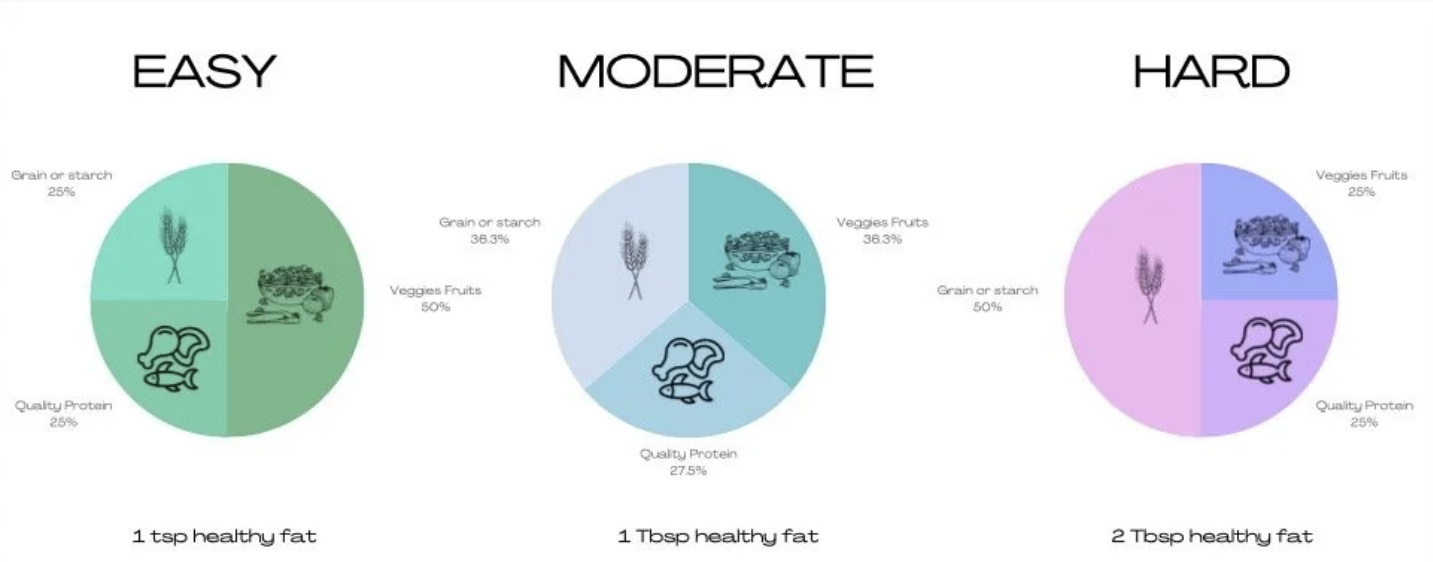The Ultimate Guide to Marathon Nutrition
Boston Marathon Finish line 2021
If you’ve been feeling overwhelmed at the thought of training for a marathon, you’re not alone. Many people don’t realize just how much marathon training impacts their day-to-day lives. Not only are you increasing the amount of time that you spend training, you then have to fit in strength work, rolling, sleep and recover, plus all the extra laundry! On top of all of that the crucial part of nursing yourself properly also requires thought, planning and execution that is likely different than your off season.
Whether this is your first marathon training journey or you simply want to feel your best as you embark on another training cycle, this guide is for you!
In this blog post, we’ll break down:
What nutrition for marathoners really is and, more importantly, why it matters
What inadequate marathon fuelling looks like and the long term implications
Actionable nutrition, lifestyle, supplement, and mindset tips to support your marathon training
Tips for choosing your running nutrition
Frequently asked questions about nutrition for marathon training
How to know when you’re ready for extra support
By the end, you’ll know the next steps to take towards feeling confident about what to eat and when to eat to cross the finish line of your next marathon feeling strong and empowered.
Ready to get more support on your nutrition journey as you embark on your marathon training?
Learn more about my signature program, Endurance Fundamentals here!
What nutrition for marathoners really is and, more importantly, why it matters
If you’re new to marathon training, it can feel a little overwhelming.
Here’s a simple explanation to make it easy: Marathon training nutrition focuses on nourishing your body with the right balance of carbohydrates, protein, and fats to support energy, recovery, and performance.
Prioritizing carbs as your main energy source, incorporating protein for muscle repair, and including healthy fats for endurance. Hydration and electrolytes are essential for maintaining performance and preventing fatigue. It invovles adequating timing your fuelling to match the energy demands of your training, ensuring you go into your workouts well fuelled, fuel adequately on longer, more intense workouts and prioritize nutrition to support your recovery after workouts.
Think of it like this:
While we know our bodies are not machines and in fact so much more complex, to simply explain the concept, I like to use the machine analogy. If your body was a machine, and your nutrition is one of its most critical components to fuel that machine. When it’s functioning well, the machine runs smoothly—you feel energized, focused, and at ease. But when something is out of balance, you can start noticing challenges, like fatigue, mood swings, headaches, illness and even injuries long term.
Why Does it Matter?
A proper focus on nutrition during marathon training isn’t just about feeling okay and getting through your workouts. It’s about thriving and finishing your training plan confidently and crossing that final finish line strong!
When your nutrition is in check, you’ll experience benefits like:
More energy to keep up with your day to day activities AND your training (and still have some left for fun!)
Improved recovery so you can keep up with your training plans and feel strong going into your next workout.
Better sleep and mood, which make every part of life feel better.
But if you’re ignoring any underfuelling symptoms, the opposite can happen. Over time, imbalances can lead to hormonal disorders, chronic fatigue, or gut conditions, illness and injuries, such as stress factures, taking runners out of the game for a long time.
This matters because you deserve to feel your best every day, whether you’re in training or not!
Start your day with lot’s of nutrients to keep you going all day!
What does inadequate marathon nutrition look like and the long term implications
When it comes to your health, we want to ensure that you’re getting the right support with any symptoms and concerns you might be experiencing.
Inadequate marathon fueling can have significant short- and long-term consequences, both for performance and overall health. Here are a few signs that might indicate it’s time to pay closer attention to your nutrition while training for a marathon:
1. Depleted Glycogen Stores and "Hitting the Wall"
Carbohydrates are the body’s primary fuel source during endurance activities. When glycogen stores in your muscles and liver run out, your body struggles to maintain energy output, resulting in extreme fatigue and a sharp decline in performance, commonly referred to as "hitting the wall” or “bonking”. This happens when runners fail to consume enough carbs leading up to or during the run. Over time, chronic under-fueling can impair the body's ability to efficiently store and utilize glycogen, making it harder to train effectively and adapt to higher workloads.
2. Poor Muscle Recovery and Increased Soreness
Protein plays a key role in muscle repair and recovery, particularly after long training runs. Without adequate protein intake, the body struggles to rebuild damaged muscle fibers, leading to prolonged soreness, reduced strength, and an increased risk of overuse injuries. Over time, inadequate protein can also lead to a loss of lean muscle mass, reducing overall running efficiency and endurance capacity.
3. Dehydration and Electrolyte Imbalances
Running, especially in warm or humid conditions, leads to significant fluid and electrolyte loss through sweat. Failing to replace these losses can cause dehydration, which impairs cardiovascular function, thermoregulation, and mental focus. Electrolyte imbalances, particularly low sodium levels (hyponatremia), can result in muscle cramps, nausea, dizziness, and in severe cases, life-threatening complications. Chronically inadequate hydration may also lead to kidney strain and reduced endurance performance over time.
4. Fatigue and Poor Performance
Under-fueling prevents your body from meeting the energy demands of training and racing. This results in persistent fatigue, slower recovery times, and diminished performance during runs. Over time, it can contribute to overtraining syndrome, a state of physical and mental exhaustion that stalls progress and increases the risk of injury or burnout.
5. Weakened Immunity and Hormonal Disruptions
Chronic energy deficits can weaken your immune system, making you more susceptible to infections, colds, and other illnesses. Additionally, under-fueling in female runners can lead to hormonal imbalances, leading to menstrual irregularities or amenorrhea (loss of periods). RED-S (Relative Energy Deficiency in Sport), a condition that negatively affects bone health, reproductive function, and cardiovascular health in both genders.
6. Increased Risk of Stress Fractures and Overuse Injuries
Inadequate nutrition deprives your body of essential nutrients like calcium, vitamin D, and magnesium, which are critical for bone health. Combined with insufficient caloric intake, this can lead to reduced bone density and an increased risk of stress fractures, especially during high-impact activities like running. A lack of proper recovery nutrition also exacerbates overuse injuries, as the body struggles to repair minor damage before the next training session.
7. Long-Term Implications
Over time, the effects of inadequate fueling extend beyond running performance:
Reduced Metabolism: Chronic under-fueling can slow down your metabolism, as your body adapts to conserve energy.
Loss of Lean Muscle Mass: Without sufficient energy and protein, your body may break down muscle tissue for fuel.
Impaired Cardiovascular Health: Prolonged energy deficits can lead to heart strain, especially in athletes with undiagnosed Relative Energy Deficiency in Sport (RED-S).
Mental Health Impacts: Persistent fatigue, reduced performance, and the physical consequences of under-fueling can affect mood, motivation, and overall mental well-being.
Marathon training places significant stress on the body, and adequate nourishment is non-negotiable for maintaining energy levels, optimizing recovery, and preventing injuries. Addressing these issues through a balanced, intentional nutrition plan is crucial for both short-term performance and long-term health.
If you recognize yourself in any of these examples, know this: you’re not alone and you don’t have to settle for feeling this way.
This is exactly what I support my client’s with inside my signature program, Endurance Essentials.
Mastering your nutrition with lots of colour and variety is key!
Nutrition Tips for Marathon Training
Nutrition is the foundation of health. What you eat impacts every system in your body - especially when embarking on the marathon journey!
The right foods can provide the building blocks your body needs to boost energy, recovery quickly and maintain balanced hormones.
The Benefits of Good Nutrition for Marathon Training:
Nutrition is important when it comes to marathon training because your body needs all the key vitamins, minerals, and macronutrients to stay balanced and energized.
When you focus on whole, nourishing foods, you can:
Reduce inflammation, which ensures you are able to recover faster and take on your next workout feeling strong.
Benefit from consistent energy levels, so you’re not riding a rollercoaster of crashes and dragging yourself out of bed after a big workout.
Ensure you aren’t hitting the wall, enrurng that you finish all your long runs and race day with enough energy.
Daily Nutrition Tips to Implement:
When it comes to nutrition, it can be hard to know how to support your marathon training in a way that works best for you, especially because everybody is different! Having said that, here are some tried and true nutrition tips you can implement today to help you on your marathon journey:
Carbs are Key: Carb-rich foods like veggies, whole grains, and legumes support th energy needed to keep you energized.
Focus on Protein: Protein helps muscle mainentance, building and recovery. Ensure you add a protein source like eggs, lean meats, fish, or plant-based proteins in every meal and snack.
Timing Matters: Ensuring you are well fuelled before, during and after your workouts will make all the difference.
Practical Tip: Try building balanced meals with the “Runner’s plate method” - a guide adapted from the Athlete’s plate developed for the American Olympic Team to help understand how your nutrition needs should be adapted based on your training.
The Runners Plate is a visual guide to help you nourish your training depending on your effort.
Remember, small changes add up! Try starting with one of the tips mentioned here and build up from there.
Practical Tips for On-the-Run Marathon Training Nutrition
To optimize your performance and recovery, here are practical strategies to implement for on-the-run fueling based on calorie and carbohydrate needs:
1. Calculate Your Calorie and Carb Needs
Use the formula 0.9 to 1.13 kcal/hour/lbs to estimate your hourly calorie needs.
For example, a 135lb runner should aim for 120–153 calories per hour.
Match your carbohydrate intake to your run duration:
Runs under 1 hour may not need fueling during, but start practicing for longer sessions.
Aim for 30–60g of carbs/hour for moderate runs.
For runs over 2–3 hours, increase intake to 60–90g/hour, split into small, manageable portions.
2. Choose Easy-to-Digest Fuel Sources
Gels, Chews, and Drinks: These are convenient, compact, and designed to be easily digested. Look for options with 20–50g of carbs per serving and minimal to no added fibre or fat to avoid GI distress.
Whole Food Options: If you prefer real food, try bananas, dates, pretzels, or even small bites of energy bars. Choose foods that are simple, portable, and low in fiber.
3. Time Your Fueling
Start Early: Begin fueling within the first 30–45 minutes of your run, even if you don’t feel tired yet. This keeps glycogen levels stable and prevents “hitting the wall.”
Fuel Regularly: Consume small amounts every 15–30 minutes to hit your hourly calorie and carb targets. For example:
One gel every 45 minutes = ~100 calories and ~25g of carbs.
Chews: 3–4 pieces every 20–30 minutes.
Practice your timing during training runs to identify what works best for your body.
4. Hydration and Electrolytes
Pair your fueling with hydration to support digestion and prevent dehydration. Sip water or an electrolyte drink regularly throughout your run.
For longer runs (over 90 minutes), include sodium and electrolytes to replace what you lose in sweat. Look for sports drinks or electrolyte tabs that contain 200–400mg of sodium per hour.
5. Troubleshoot GI Distress
Train Your Gut: Practice your fueling strategy during training runs to help your body adapt to digesting carbs while running.
Avoid Fiber and Fat: These can slow digestion and lead to discomfort. Stick to low-fiber options for pre-run and on-the-run fueling.
Adjust Timing: If you experience nausea, try smaller portions more frequently or pair gels with small sips of water.
6. Post-Run Recovery
Within 30–60 minutes of finishing, replenish with a meal or snack that includes carbs and protein in a 3:1 ratio (e.g., a smoothie with fruit and protein powder or toast with nut butter and a banana). Rehydrating with water or an electrolyte drink is also key for recovery.
Nutrition, hydration, safety and something to pack it all into!
Supplement Tips for Marathon Training
While food should always come first, supplements can be a game-changer when it comes to your marathon training fuelling strategy.
If your body is depleted of key nutrients, or you’re struggling to meet your needs through diet alone, the right supplements can help fill in the gaps and give your body the extra support it needs because the demands of marathon training can be so big.
Why Supplements Matter for Marathon Training:
Your body requires specific vitamins, minerals, and nutrients to function optimally, and deficiencies in certain nutrients can lead to symptoms such as:
Low energy and fatigue
GI Distress and/or digestive discomfort
Nutritional deficientcies, like iron, calcium, magnesium
Frequent illness as the body’s immune system isn’t able to recover
Stress fractures due to lower recovery and/or nutritional deficienticies
When it comes to marathon training your body may actually need extra nutrients to support the intense training load that demands proper hormone balance, extra energy, and faster recovery.
By using high-quality supplements targeted for marathon training, you can:
Restore balance to systems that are out of sync
Improve energy levels and ensure you aren’t feeling depleted
Support long-term health without feeling like you’re playing catch-up because you are giving your body what it needs
Tips for Choosing and Implementing Supplements:
Before you go running to the store to find supplements that are best for marathoners, here are some tips to consider:
Start with professional guidance
It’s always best to consult with a qualified nutritionist or health professional before starting supplements. They can identify the root cause of your imbalances and recommend exactly what you need. A professional can also recommend tests to understand your current levels so that you’re targeting your specific deficiencies.Focus on quality over quantity
Not all supplements are created equal. Look for:Brands with third-party testing (I like to recommend brands like AOR, Thorn or Genestra, with high standards for testing and ingredients. They me be a bit more expensive, but you know you are getting the highest quality).
High bioavailability (meaning your body can absorb them easily).
Minimal fillers or artificial ingredients
Some foundational supplements to consider:
Magnesium: Supports muscle recovery, stress reduction, better sleep, hormone balance
Probiotics: Helps restore gut health and improve digestion
Omega-3 Fatty Acids: Reduces inflammation and supports brain function
Incorporate them into your daily routine.
To make supplements a habit:Take them at the same time each day (pair with meals , most are best taken in the morning with breakfast or as part of your bedtime routine, like magnesium before bed or epsom salts in your bath.
Use a pill organizer or set phone reminders.
Start with 1-2 key supplements—don’t overwhelm yourself with more than that.
Remember: Supplements are supportive tools, not quick fixes. Combine them with good nutrition, lifestyle habits, and consistency for the best results, and always consult with a health practitioner before adding supplements to your routine.
I go more in detail about my favourite supplements in my Supplements for Runners blog post.
Tips for Choosing Your Running Nutrition
If you’re training for a marathon, you are going to need to nourish your training and race day well. The best way to do this is to start practicing your fuelling strategy during your training cycle. This way you can ensure the best success on race day, because, as the saying goes: “you don’t want to try anything new on race day!”.
Why Fuelling During Your Long Runs is Important:
Fueling for long runs is essential because it helps maintain energy levels, optimize performance, and prevent fatigue and injury.
1. Sustaining Energy
During long runs, your body relies heavily on glycogen (stored carbohydrates) as a primary energy source. These stores are limited and can be depleted after 60–90 minutes of moderate to intense exercise.
Consuming carbohydrates during the run replenishes glycogen and prevents the dreaded "bonk" or hitting the wall.
2. Delaying Fatigue
As glycogen gets depleted as you run, your body shifts to other energy sources in your body that are not as quick to convert to glucose and can cause your pace to drop. Proper fueling ensures a steady supply of readily available energy to keep you going at your desired intensity.
3. Supporting Brain Function
Glucose is critical for brain function. Without adequate fuel, mental fatigue can set in, leading to poor decision-making, reduced focus, and a lack of motivation during your run and makes that marathon math extra hard!
4. Improving Recovery
Proper fueling helps minimize the stress placed on your body during a long run, reducing muscle breakdown and speeding up post-run recovery and even preventing injury in the long run.
5. Preventing Dehydration and Electrolyte Imbalance
Many fueling products include electrolytes, which help replace sodium and potassium lost through sweat, reducing the risk of cramps and maintaining hydration balance.
Fueling is not just about energy on your run, it’s about preserving your body’s ability to perform, recover, and adapt to the demands of training. Practicing a personalized fueling strategy during your long runs ensures you’re prepared for race day, both physically and mentally.
Tips to Find the Gel That’s Right for You:
Match Your Tolerance: Test gels during training runs to ensure they sit well with your stomach and don’t cause GI distress. Try experimenting with small amounts and adjusting based on how you feel.
Contain Dual-Source Carbs: Look for gels that provide a combination of glucose, sucrose or fructose for optimal carbohydrate absorption, although high amounts of fructose can cause more GI issues in some people. This combination helps maximize energy uptake during endurance events.
Avoid Excessive Additives: Minimize gels with artificial sweeteners or high concentrations of caffeine because they can upset the stomach or interfere with performance.
Sodium and Electrolytes: Choose gels with adequate sodium to support hydration and electrolyte balance, especially during long or hot runs. If your gels don’t have electrolytes, consider adding them to your water bottle.
Natural Ingredients: If possible, opt for gels made with real food ingredients and minimal preservatives to reduce the risk of gut issues.
If you’re looking for alternatives to traditional gels, check out my Endurance Fuelling with Whole Foods blog post with lots of ideas on foods you can experiment with, like dates, rice cakes, or DIY sports fuel, if commercial gels aren’t working for you. Always practice your fueling strategy in training to ensure it supports your race-day needs effectively.
Energy balls are a great way to fuel your runs or have as snacks!
Lifestyle Tips for Marathon Training
While nutrition is critical, your daily lifestyle habits play a huge role in how your body functions. From sleep to stress, these areas often make or break your marathon training journey.
Lifestyle Benefits for marathon training:
Your daily habits impact your energy, sleep, and ability to manage energy levels while training for a marathon. When you prioritize healthy habits, you can:
Feel stronger and more resilient, physically and mentally
Reduce stress, which directly impacts hormones, digestion, and energy levels
Sleep better, helping your body recover and rebalance overnight
Actionable Lifestyle Tips:
If you want to start making some lifestyle changes to your routine to help support your marathon training to stay healthy, here are some tips you can try:
Prioritize quality sleep
Sleep is your body’s time to heal, so aim for 7-9 hours of restful sleep every night. Create a nighttime routine with calming habits like reading, stretching, or deep breathing to help you fall and stay asleep.Manage stress proactively
We tend to forget that running and exercise in general create stress in our bodies, so when we have added life stresses, it can wreak havoc on your marathon training, so try:Scheduling in downtime to let your body rest
Take full rest days, they are just as important as the training days in the overall training plan
Try lower impact active rest activities, like yoga, foam rolling or stretching sessions
Practicing mindfulness or meditation
Taking regular baths with epsom salts to support recovery and sooth stress away
Make time for friends and family
Marathon training demands a lot of time, so it’s important not to lose sight of the importance of you family, friends and community who may not be part of, or even understand your marathon training journey. Who know, you might even be inspiring them to embark on their own running journey!
Create a balanced routine
Feeling overwhelmed? Start with small rituals—like 10 minutes of quiet time in the morning, taking time to plan your weekly meals, schedule in time with friends and family to ensure those relationships stay strong.
Action Step: Pick one habit to focus on this week—small changes add up!
Frequently Asked Questions About Marathon Fuelling
Have questions about marathon training nutrition? You’re not alone!
Here are some of the most common questions I hear from clients:
How do I know if I’m getting what I need, or eating “enough”?
Early signs can include fatigue, weight gain, mood swings, or irregular digestion. These are signals your body needs extra nourishment and that your current diet may not be meeting the energy expenditure and nutrients that you need while marathon training.
How long does it take to see improvements in my marathon training
This depends on your starting point and consistency. Small improvements like meal timing, can often happen within a few days, while deeper changes relating to deeper health challenges may take 3-6 months.
Do I need to follow a strict diet to improve my marathon training?
Absolutely not! It’s about balance, not restriction. By focusing on whole, nutrient-dense foods 80% of the time, you can make significant progress without feeling deprived. I always start with additions rather than restrictions or removing any foods. I will also probably tell you to eat more carbs! :)
My body doesn’t do well on carbs, what can I do instead?
We will work to address the underlying symptoms to understand why carbs may be having a negative impact on your system. However, often it’s the type of carb, the timing and the lack of carb that have made the biggest difference in my clients performance.
Do I need professional support to improve my marathon training experience?
While you can start with the tips in this post, working with a professional can give you personalized guidance and speed up your progress, as well as help you address any underlying issues that could be causing unwanted symptoms during your training.
Have more questions? Book in a Discovery Call so we can chat through your questions together!
Crossing the finish line at the 48km North Shore Knee Knacker in 2023
How to Know If You’re Ready for Personalized Nutrition Coaching
If you’ve been trying to figure out how to help yourself on your marathon journey on your own and aren’t seeing the progress you want, it might be time for extra support.
Here’s how to know if you’re ready:
You’re tired of feeling “off,” having low-energy and feeling unbalanced
You’ve tried everything and still aren’t seeig the results you want
You are experiencing GI issues or other symptoms that you aren’t able to remedy yourself or it’s taking you out of training entirely
You want a plan tailored to your unique body, lifestyle, and goals so you don’t even have to think about it in your busy schedule
Imagine this: A few months from now, you could be waking up feeling energized, excited, and confident, knowing exactly how to support your body through this difficult journey.
Here’s what support can look like:
Working with a nutritionist who can identify the root cause of your symptoms
Following a step-by-step plan with clear guidance that matches your specific energy needs and workouts
Receiving accountability and encouragement to help you stay on track
Ready to Take the Next Step Toward Better Marathon Training?
Improving and thriving in your marathon journey is absolutely possible for you!
With the right tools, habits, and mindset, you can finally feel strong, vibrant and injury free so you can cross that finish line feeling amazing on race day!
If you’re ready for personalized support to fast-track your progress, I’d love to work with you inside my Endurance Essentials nutrition coaching program.
Schedule a free discovery call with me today:
Your body deserves this care—and so do you.
In this Ultimate Guide to Marathon Training Nutrition, we’ve explored everything you need to know to navigate your nutrition choices with confidence and ease.
From understanding what this journey looks like and why it matters, to actionable tips for nutrition, lifestyle, supplementation, and mindset, this guide is designed to empower you with the tools to take charge of your well-being.
Whether you’re just starting to notice changes or are ready to dive deeper into personalized support, every small step you take brings you closer to a healthier, more vibrant you.
Remember, marathon training isn’t just a challenge—it’s an opportunity to embrace growth, prioritize yourself, and discover how strong you really are. You’ve got this!
Like this post and want to read more? Check out my other resources:










